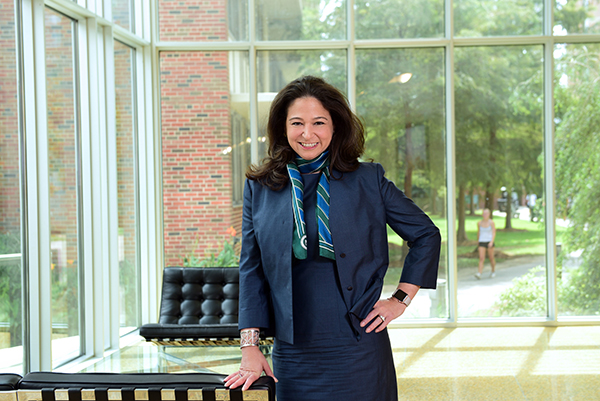
Professor of Practice Mara Force draws on 18 years of experience as a managing director at JPMorgan to teach the Aaron Selber Jr. Course on Hedge Funds.
Mara Force spent 18 years at JPMorgan working with hedge funds and hedge fund managers. Now, as a Freeman School professor of practice and instructor in the Aaron Selber Jr. Course on Hedge Funds, she’s helping students to understand and master the notoriously Byzantine investment category.
“This course is fascinating to teach, and not just because it’s in an experiential learning format,” says Force, who joined the Freeman faculty in 2017 after serving as a managing director and head of Private Client Trust at JPMorgan. “I love the subject matter and I love how excited the students get about it and the manner in which they’re learning.”
Over the course of 15 weeks, Force’s students learn what hedge funds are, how they’re set up and regulated, and what strategies they use to deliver returns for their investors. Along the way, hedge fund managers like Jeffrey Sarrett, managing director of portfolio management at Vatera Holdings, and Darren Kottle, founder and chief investment officer of Caddo Capital, deliver guest lectures to provide the students with real-world insights about running a fund.
The course also explores the impact of hedge funds on society. Force has her students research and present cases on famous — and sometimes infamous — trades, such as the collapse of Long-Term Capital Management and George Soros’ bet against the Bank of England.
The centerpiece of the course, however, is an experiential-learning project in which the students build their own hedge funds. Working in teams and with the support of an expert mentor for guidance, the students choose a strategy and then carefully assemble a portfolio of investments that matches the strategy and produces the expected returns. Along with that, the students have to develop rules and restrictions, risk management politics and — perhaps most importantly — a convincing pitch to win over skeptical investors.
“You may have a great idea, but if you don’t think you can sell it, you might want to try your second best idea,” Force says. “Just because you’re a hammer doesn’t mean everything is a nail.”
At the end of the semester, the teams present their funds and explain their strategies in a class pitch contest. The top three teams as chosen by the mentors then face off in a final competition with members of the Selber family serving as judges. The winning team will receive a grand prize of $1,000.
While her students probably won’t be starting their own hedge funds immediately after graduating, Force says she hopes they emerge with the knowledge, skills and experience to contribute on day one at a hedge fund or any firm that deals with hedge funds.
“I want my students to understand the difference between theory and reality, and I want them to understand the appropriate ethics of investing,” Force says. “But most of all, I want them to love learning about the structures and strategies and find them as fascinating and interesting as I do.”

